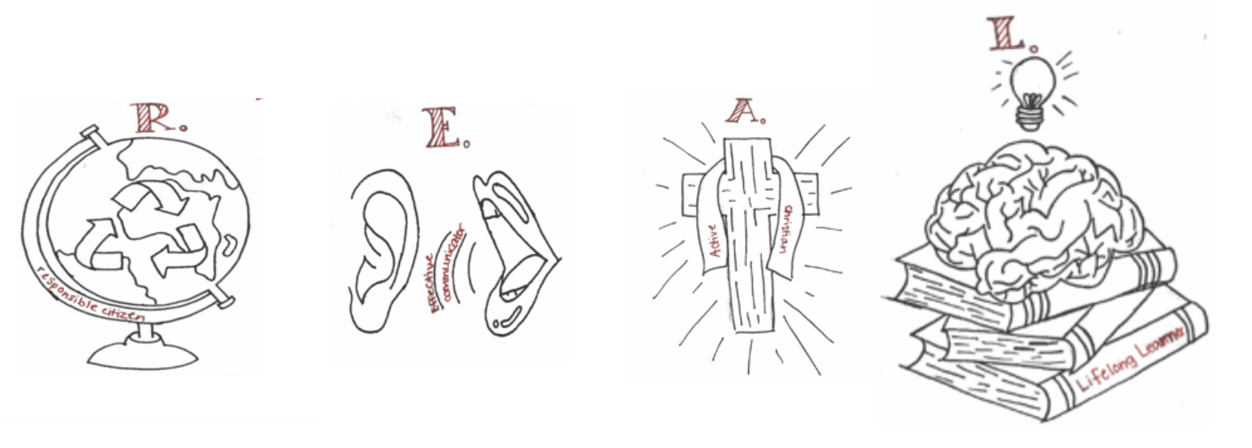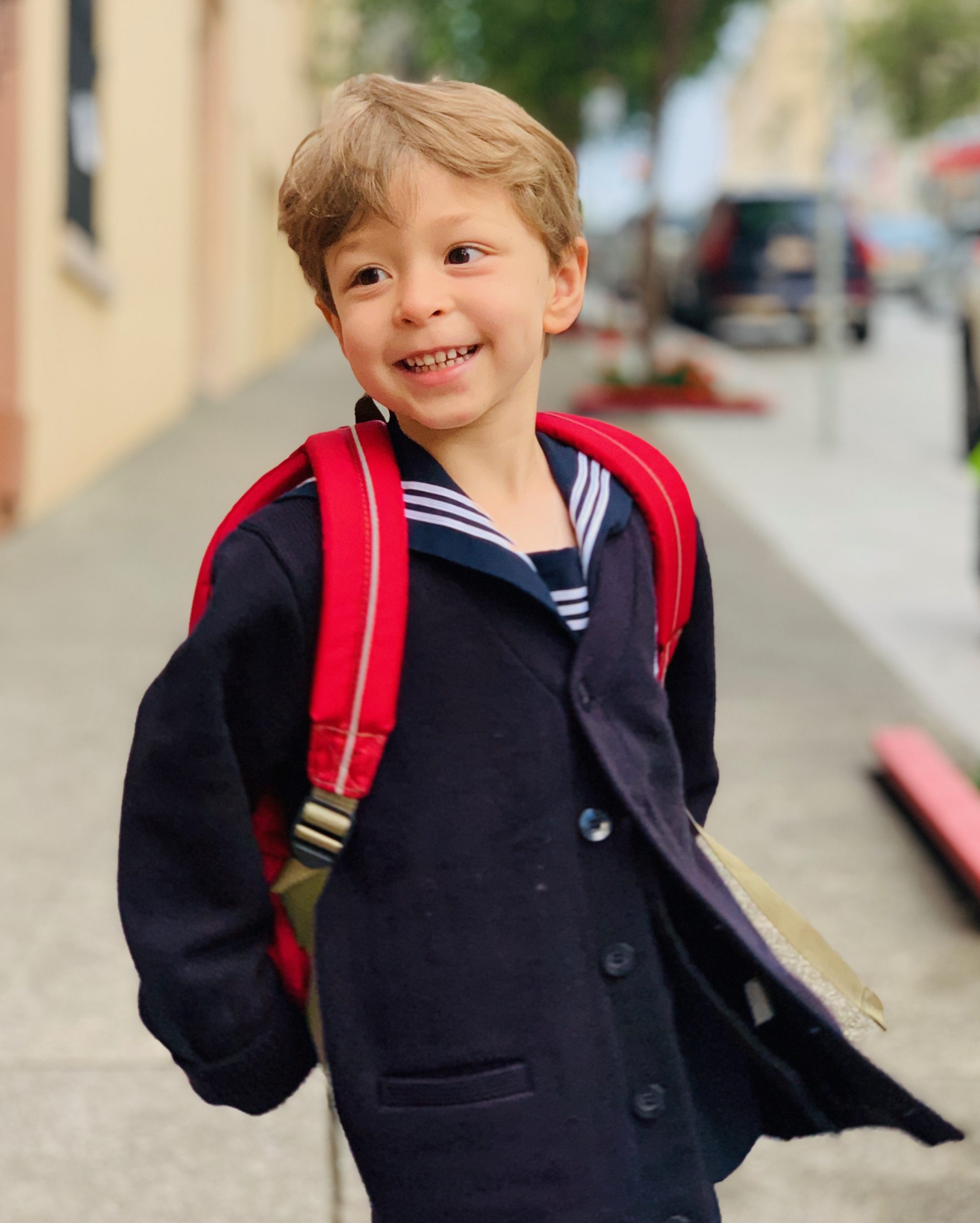
Project-based learning is a common thread for grades 3, 4 and 5. There is an emphasis on critical thinking, independence, confidence and collaboration. The students are supported with a variety of specialists in Art, Technology, Library, Physical Education, and Life Skills. Students advance to the upper grade French teacher, Monsieur Palomo where grammar, dialogue, and vocabulary in the French language are taught daily.Learn more about the different aspects of the Elementary experience at École Notre Dame des Victoires.

Buddy Program
The Buddy program pairs up students in the primary grades with students in the junior high. Activities shared includes pen pals, storytelling, oral interpretation of children’s literature and other field trips during the year. Students in grades 1st & 7th, 2nd & 6th and 3rd, 4th, 5th are paired up and meet throughout the year to create projects or enjoy activities. All activities help to build bonds between the children and generally strengthens our school community. In addition, a sense of support and care is experienced by the students. Many of these relationships have become very special to students who have maintained deep bonds even after graduation.
Choral Festival
Fourth and fifth grade classes participate in an Archdiocese of San Francisco Choral Festival at Archbishop Riordon High School.
French Language and Culture
The program includes daily French instruction classes taught by native French speakers. Grammar and conversation are integral to the program, and developing a proper accent and fluid speaking ability is a major goal. Skits, dramatization, songs and poetry recitation, seasonal vocabulary and a large variety of activities and projects enrich the children’s experience. Students regularly break into smaller groups to practice dialogues. More advanced French speaking students are provided with more challenging language development activities.
Social Studies
The theme of community is a large aspect of social studies in the early grades of elementary school. The study of world cultures and differing peoples’ way of daily life gives way to learning about the early colonies of New England and various regions of our country including the plains and life as a Native American. California state history is studied in grade four and a greater depth of study in American history is continued in grade five. Field trips to nearby civic agencies, Bay Area museums and historical sites bring greater understanding to concepts learned in the formal classroom. Project work and hands-on activities enrich the children’s experience.
Language Arts
The primary grades feature a language arts program that includes a curriculum balanced with phonics and literature which provides a strong base for each child’s beginning reading experience. Commencing in kindergarten and continuing through fifth grade and beyond, the students are exposed to a wealth of reading material that is available in the individual classrooms as well as in the primary and upper grade libraries. Reading aloud is a main part of the language arts program as well as leveled beginning literature selections.
Chapter books are integral to the curriculum and guided reading and literature circles deepen the students’ understanding and experience of fiction and non-fiction selections. Writing is a major aspect of the learning program starting with inventive spelling that is eventually edited and creations are then ready for “publishing.” The expression, sharing and celebration of ideas and experiences are major focuses of the program. Writing and vocabulary development is integrated into all areas of the curriculum. A professional storyteller visits each grade multiple times a year which provides children with the opportunity to deepen their listening skills and imagination. Students are encouraged to share their writing aloud with members of their own class but also with others in the school community. It is common to find an enthusiastic second grader presenting his or her piece of fiction to the kindergarten class one day, then have an audience of one with the principal the next. We write, after all, to communicate our thoughts and ideas and it is important to share them with as wide an audience as possible.
Mathematics
Basic skills are taught throughout the curriculum which includes the use of manipulatives to assist the students with developing a deeper understanding of the concepts presented. Through direct instruction, cooperative learning and one-to-one guidance from the teacher and or aide, students solve problems and apply mathematical skills to the real world. Students use a variety of strategies, such as estimation, data gathering and analysis, graphing, and probability to solve problems. They investigate, learn to understand and apply the concepts of time, money and measurement. Students are taught the concepts of place value, multiplication, division, addition and subtraction of fractions and decimals. Understanding and solving word problems is integral to the math program. NDV follows the common core state standards for teaching mathematics.
Physical Instruction
NDV values the need for children to run and jump and play. Physical education classes are taught on a weekly basis in the school gymnasium by a credentialed instructor whose lengthy tenure has produced an impressive learning program for our children. Many NDV athletes have gone on to be successful in competitive sports at the high school level. Each PE session opens with a period of exercise and several invigorating laps around the upper level or lower track. Skills needed for specific sports are taught and team play is organized. Physical fitness and nutrition are important elements of the program. Participation in cross country and track events sponsored by Catholic Charities Catholic Youth Organization (CCCYO) is strongly encouraged.
NDV celebrates its teams in basketball, volleyball and soccer. Parents are deeply involved as team coaches or organizers for each grade. Beginning in grade three, teams compete through the CCCYO. In grades K-2, parents can organize teams through other city leagues such as the Viking League.
Religion
Daily, formal religious instruction is an integral part of the students’ education program. The students learn about the traditions and the liturgical seasons of the Catholic Church. Formal prayers are taught and all students create original prayers. All grades attend monthly school Masses. Students learn about various Bible stories and in second grade learn, in greater depth, about the sacraments of Reconciliation and Eucharist. Formal reception of these two sacraments takes place in the second grade year. Daily prayer experiences are planned throughout the school year, and a Marist priest visits each class twice per month to provide additional background in the Catholic faith. Family Life instruction is integrated into the religion program as well.
Science
Hands-on exploration brings the study of scientific concepts to life. Physical science includes activities related to forms of matter, different forms of energy and patterns of change in our world. Children study the push-and-pull of magnets, the basic principles of sound and light, and that weather conditions change and can be measured. Earth science includes concepts that reveal that matter can be observed and classified and that there are observable changes on earth related to the study of rocks, crystals, water, volcanoes, earthquakes and general landforms. Life science study reflects that living things have observable characteristics that make them different from non-living things. This includes learning about the five senses, plants and animals, the caterpillar to butterfly life cycle, insects, dinosaurs and animal classification and their living habitats. Students also learn to celebrate the wonder of God’s creation.
Student Success Team
At NDV we use the Student Success Team to help our students have a successful school experience. The Student Success Team is comprised of the student’s teachers, counselor, vice principal, principal and parents. The vice principal acts as the facilitator and note taker. Our purpose is to support our students’ academic, spiritual, social, and emotional well-being. Having the student’s teachers and his/her parents together provides us with a more complete picture of the student.
When a parent or teacher feels a student would benefit from an SST meeting, a Student Referral Form is initiated by the student’s teacher to begin the process. The form indicates areas of strength, areas of concern and interventions which have been used with the student. The parents also complete a Parent Preparation Form indicating the student’s strengths, the parents’ concerns, what motivates the student, and the parents’ goals and expectations for the student.
At the SST meeting, we develop an Action Plan to help the student become more successful at NDV. The Action Plan might include interventions such as, working with teachers after school, working with a tutor, monitoring of the student’s planner, and/or a request for a psycho-educational assessment to see how the student learns. The vice principal will summarize the SST meeting articulating the agreed upon interventions intended to assist the child in becoming a successful learner. Each participant will receive a written copy of the Action Plan.
Response to Intervention (RTI) forms will be part of the student’s report card. The RTI will list the interventions and the student’s progress using each intervention. Follow up meetings will be held if deemed necessary.
Technology
Students attend a formal computer technology class one day per week guided by the full time computer teacher to become more proficient with keyboarding and creative publishing. The students are focused and energetic with their use of the computer resources, and as their instruction grows into the need for deeper research, the students are also taught how to use the Internet as a research tool. Coding and word processing are included in computer class.

Contact NDV School
École Notre Dame des Victoires
659 Pine Street
San Francisco, CA 94108
ph 415.421.0069
office@ndvsf.org
Contact NDV Church
Église Notre Dame des Victoires
566 Bush Street
San Francisco, CA 94108
ph 415.397.0113
ndvsf.org
More Information
NDV is a member of the Western Association of Schools and Colleges, the Western Catholic Educational Association, the CSJ Educational Network, and the Society of Mary.


